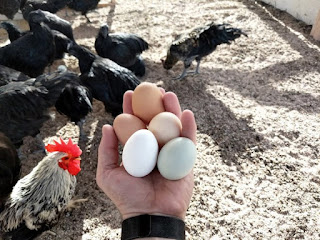First the Chicken — or Maybe the Egg
Meeting up with my old friend Hammond Suisse in town for lunch, we placed our orders at the eatery. He wanted fried chicken and I had a hankering for an omelette. Hammond joked that we would find out which comes first, the chicken or the eggs.
If you study on it a spell, you may realize that the old question has an evolutionary basis. Biblical creationists know that God created the functionally mature chicken first so it could lay eggs. Actually, yes and no. The answer is not quite so straightforward.
 |
| Chickens and eggs, Unsplash / Daniel Tuttle |
Creationists study baraminology, which is the study of the created kinds in the Bible. Those are not species, and are roughly equivalent to families in the secular system. They studied on which birds can hybridize with chickens. Since we believe that the Creator equipped original parent kinds to have a passel of DNA and epigenetic switches, and therefore we believe in speciation, chickens probably came from pheasant-like birds.
A big problem from an evolutionary standpoint is that a bird's egg shows design and specified complexity. The chicken would have to lay the egg because it has the genetic material necessary. Do you see the tears in Darwin's eyes?
What do creationists believe? On day five of creation week, God created “every winged bird according to its kind” (Genesis 1:21). God created mature birds with the ability to reproduce. So the bird was first, ready to lay eggs.While we know that birds came first, that fails to address the specific question about domesticated chickens. Is it possible to determine the chicken’s ancestor that was created on day five? Classification research is a very young field, but chickens happen to be one of the creatures that creationists have investigated to identify the original parent kinds.
You can hatch up a scheme to read the entire article at "Which Came First—The Chicken or the Egg?" Also of interest is "Learning to Appreciate Chickens." Oh, and which came first in our orders? The waitress brought them both at the same time.